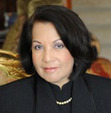Rachel Hajar's Blog: My Life in Doha - Posts Tagged "blind"
Lawful magic and a blind Arab poet
“Clouddust of battle over their heads was like the night
And glitter flashes from the motion of our swords
Lighted the darkness like falling stars.”
Bashar Ibn Burd (714-784 AD)
(Trans. By HH)
The verse above is extracted from a poem by Bashar Ibn Burd praising his tribe during a battle with an enemy. The visual comparisons used are remarkable and one would never suspect on reading the above verse that the poet was blind. Bashar Ibn Burd was born blind.
Some famous poets in Western literature were also blind: Homer, Milton, Helen Keller, Jose Luis Borges, James Thurber, James Joyce . . . to name a few.
I sometimes wonder how blind poets/writers are able to craft beautiful words to convey a visual image . . . how do they craft the visual similes and metaphors?
Bashar Ibn Burd lived in 8th century Baghdad during the rule of the Abbasids (rulers of the Arab Empire whose capital was Baghdad from 750 AD to 1258 AD). Then as now, poetry was central to Arab social life. I have observed first hand how Arabs are fascinated with poetry. Who can forget the image of Saddam Hussein reading a poem he supposedly composed on the eve of the US bombing of Iraq? That was certainly surreal.
Historians and social observers state that no people in the world are so moved by the word, spoken or written, as the Arabs. Sometimes, I read in the newspaper how modern audiences in Baghdad, Damascus, or Cairo are stirred to the highest degree when there is a recital of poems. The poems maybe only vaguely comprehended or partially understood. The rhythm, the rhyme, and the music, produces on them the effect of what they call “lawful magic.”
In their history, there was always the sha’ir or tribal poet filling the role of historian and propagandist. The poet praised his tribe, elevating it over other tribes and denigrating or putting down other tribes. Thus, the poet boosted the morale of the tribe especially in times of war.
But another function of the poet was to write poems in praise of a ruler, and so Arab courts competed to retain in their courts the best of the Arab poets of the day and were amply compensated. Remnants of this practice still exist today. In the Arabian Gulf states there are still people who write poetry excessively praising a ruler or someone in power expecting to be amply rewarded. It is a form of social hypocrisy that is accepted in the society.
In the case of Bashar, he was condemned to death by the king (Al-Mahdi, 745 – 785 AD) because he criticized the king in a poem. That was a crime in those days. These days, such extreme punishment no longer exists but you could lose your job.
Rachel Hajar, M.D.
My Life in Doha: Between Dream and Reality
http://www.strategicpublishinggroup.c...
www.amazon.com
www.barnesandnoble.com
And glitter flashes from the motion of our swords
Lighted the darkness like falling stars.”
Bashar Ibn Burd (714-784 AD)
(Trans. By HH)
The verse above is extracted from a poem by Bashar Ibn Burd praising his tribe during a battle with an enemy. The visual comparisons used are remarkable and one would never suspect on reading the above verse that the poet was blind. Bashar Ibn Burd was born blind.
Some famous poets in Western literature were also blind: Homer, Milton, Helen Keller, Jose Luis Borges, James Thurber, James Joyce . . . to name a few.
I sometimes wonder how blind poets/writers are able to craft beautiful words to convey a visual image . . . how do they craft the visual similes and metaphors?
Bashar Ibn Burd lived in 8th century Baghdad during the rule of the Abbasids (rulers of the Arab Empire whose capital was Baghdad from 750 AD to 1258 AD). Then as now, poetry was central to Arab social life. I have observed first hand how Arabs are fascinated with poetry. Who can forget the image of Saddam Hussein reading a poem he supposedly composed on the eve of the US bombing of Iraq? That was certainly surreal.
Historians and social observers state that no people in the world are so moved by the word, spoken or written, as the Arabs. Sometimes, I read in the newspaper how modern audiences in Baghdad, Damascus, or Cairo are stirred to the highest degree when there is a recital of poems. The poems maybe only vaguely comprehended or partially understood. The rhythm, the rhyme, and the music, produces on them the effect of what they call “lawful magic.”
In their history, there was always the sha’ir or tribal poet filling the role of historian and propagandist. The poet praised his tribe, elevating it over other tribes and denigrating or putting down other tribes. Thus, the poet boosted the morale of the tribe especially in times of war.
But another function of the poet was to write poems in praise of a ruler, and so Arab courts competed to retain in their courts the best of the Arab poets of the day and were amply compensated. Remnants of this practice still exist today. In the Arabian Gulf states there are still people who write poetry excessively praising a ruler or someone in power expecting to be amply rewarded. It is a form of social hypocrisy that is accepted in the society.
In the case of Bashar, he was condemned to death by the king (Al-Mahdi, 745 – 785 AD) because he criticized the king in a poem. That was a crime in those days. These days, such extreme punishment no longer exists but you could lose your job.
Rachel Hajar, M.D.
My Life in Doha: Between Dream and Reality
http://www.strategicpublishinggroup.c...
www.amazon.com
www.barnesandnoble.com
Published on March 02, 2011 12:42
•
Tags:
arab, arab-poetry, blind, culture, lawful-magic, life, lifestyle, lirerature, magic, my-life-in-doha, pigeon, poem, poetry, rachel-hajar



